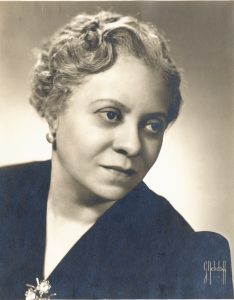
HAPPY HUMP DAY P.O.U.!
FLORENCE BEATRICE PRICE
Florence Beatrice Price (April 9, 1887 – June 3, 1953) was an African-American classical composer. She was the first African-American woman to be recognized as a symphonic composer, and the first to have a composition played by a major orchestra.[1]
Biography
Childhood and youth
Price was born to Florence Gulliver and James H. Smith on April 9, 1887 in Little Rock, Arkansas.[2]Price was one of three children in a mixed race family. Despite racial issues of the era, Price’s family was well respected and did well within their community. Her father was a dentist and her mother was a music teacher who guided Florence’s early musical training. Price had her first piano performance at the age of four and went on to have her first composition published at the age of 11.[3] By the time she was 14, Price had graduated from Capitol High School at the top of her class and was enrolled in the New England Conservatory of Music with a major in piano and organ. Initially, Price pretended to be Mexican to avoid the stigma people had towards African-Americans at the time. At the Conservatory, Price was able to study composition and counterpoint with composers George Chadwick and Frederick Converse.[4] Also while there, she wrote her first string trio and symphony. She graduated in 1906[5] with honors and both an artist diploma in organ and a teaching certificate.
Career
Price taught in Arkansas briefly before moving to Atlanta, Georgia in 1910, where she became the head of Clark University’s music department. In 1912, Price married Thomas J. Price, an attorney, and moved back to Little Rock, Arkansas. After a series of racial incidents in Little Rock, particularly a lynching that took place in 1927, the family moved to Chicago where Price began a new and fulfilling period in her compositional career. She studied composition, orchestration, and organ with the leading teachers in the city including Arthur Olaf Anderson, Carl Busch, Wesley La Violette, andLeo Sowerby, and published four pieces for piano in 1928. While in Chicago, Price was at various times enrolled at the Chicago Musical College, Chicago Teacher’s College, University of Chicago, and American Conservatory of Music, studying languages and liberal arts subjects as well as music.
Financial struggles led to a divorce in 1931, and Florence became a single mother to her two daughters. To make ends meet, she worked as an organist for silent film screenings and composed songs for radio ads under a pen name. During this time, Price lived with friends and eventually moved in with her student and friend, Margaret Bonds, also a black pianist and composer. This friendship connected Price with writer Langston Hughes and contralto Marian Anderson, both prominent figures in the art world who aided in Price’s future success as a composer. Together, Price and Bonds began to achieve national recognition for their compositions and performances. In 1932, both Price and Bonds submitted compositions for Wanamaker Foundation Awards. Price won first prize with her Symphony in E minor, and third for her Piano Sonata, earning her a $500 prize.[6]Bonds came in first place in the song category, with a song entitled “Sea Ghost.” The Chicago Symphony Orchestra, conducted by Frederick Stock, premiered the Symphony on June 15, 1933, making Price’s piece the first composition by an African-American woman to be played by a major orchestra.[6][7][8] A number of Price’s other orchestral works were also played by the WPA Symphony Orchestra of Detroit and the Chicago Women’s Symphony. Price wrote other extended works for orchestra, chamber works, art songs, works for violin, organ anthems, piano pieces, spiritual arrangements, four symphonies, three piano concertos, and a violin concerto. Some of her more popular works are: “Three Little Negro Dances,” “Songs to a Dark Virgin,” “My Soul’s Been Anchored in de Lord” for piano or orchestra and voice, and “Moon Bridge.” Price made considerable use of characteristic black melodies and rhythms in many of her works. Her Concert Overture on Negro Spirituals, Symphony in E minor, and Negro Folksongs in Counterpoint for string quartet, all serve as excellent examples of her idiomatic work.
Price was inducted into the American Society of Composers, Authors, and Publishers in 1940 for her work as a composer. In 1949, Price published two of her spiritual arrangements, “I Am Bound for the Kingdom,” and “I’m Workin’ on My Buildin’,” and dedicated them to Marian Anderson, who performed them on a regular basis.
On June 3, 1953, Price died from a stroke in Chicago, Illinois. Following her death, much of her work was overshadowed as new musical styles emerged that fit the changing tastes of modern society. Some of her work was lost, but as more African-American and female composers have gained attention for their works, so has Price. In 2001, the Women’s Philharmonic created an album of some of her work. Pianist Karen Walwyn and The New Black Repertory Ensemble performed Price’s “Concerto in One Movement” and “Symphony in E minor” in December 2011.[9][10]
Composition style
Even though her training was steeped in European tradition, Price’s music consists of mostly the American idiom and reveals her Southern roots. Price wrote with a vernacular style, using sounds and ideas that fit the reality of urban society. Being deeply religious, Price frequently used the music of the African-American church as material for her arrangements. At the urging of her mentor George Whitefield Chadwick, Price began to incorporate elements of African-American spirituals, emphasizing the rhythm and syncopation of the spirituals rather than just using the text. Price’s melodies were blues-inspired and mixed with more traditional, European Romantic techniques. The weaving of tradition and modernism reflected the way life was for African Americans in large cities at the time.
(SOURCE: Wikipedia)
Concerto in One Movement and Symphony In E Minor

